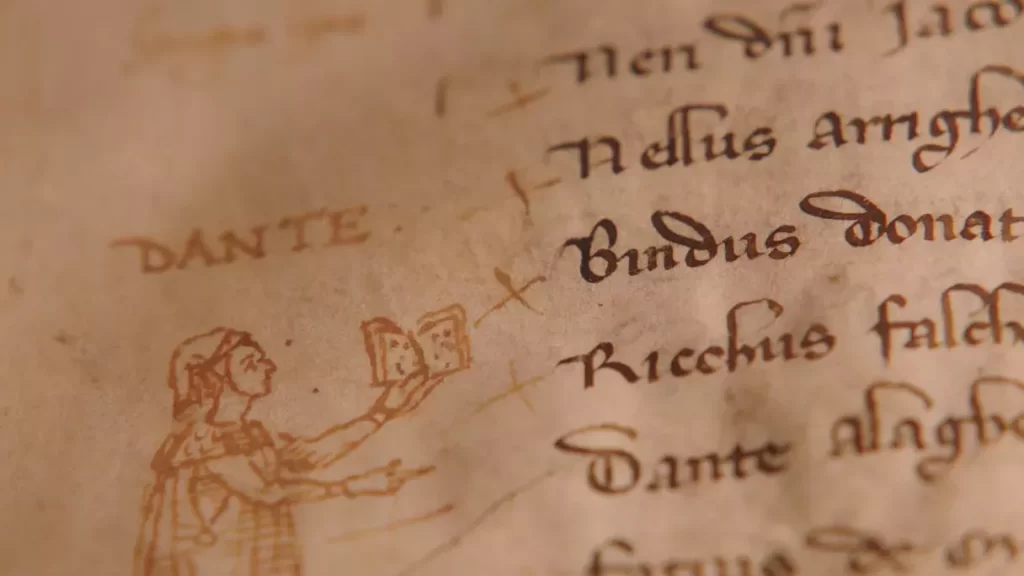Dante: Inferno to Paradise (PBS)
Dante: Inferno to Paradise is a two-part, four-hour documentary film chronicling the life, work and legacy of the great 14th century Florentine poet, Dante Alighieri, and his epic masterpiece, The Divine Comedy, one of the greatest achievements in the history of Western Literature.
The ambition of the film, which combines powerful dramatic reenactments, colorful interviews with renowned scholars, exquisite archival material and scenic filming, is to bring to life and make accessible, to the widest possible audience, the transformative power and beauty of this singular work of art. The film is divided into two two-hour episodes.
– PBS show page
PBS is airing a documentary by Ric Burns on Dante and his Divine Comedy. Click on the links above while they still work for more information and access to streaming this two-part film. Dante: Inferno to Paradise is a wonderful introduction to the author and his work. If you have been delaying tackling the The Divine Comedy or never made it past Inferno, I highly recommend watching this to get you in the mood to tackle the whole work.
The documentary combines live acting, shots of locations mentioned, and vibrant art pieces, a fairly standard approach on history pieces today but of much higher quality than is usually seen. It also does a good job of providing the framework and categorization to see how everything fits together while also supplying many readings from the poem.
The three parts of the work are covered selectively in order to fit into a four-hour documentary. In addition to outlining the story, emphasis on themes and motifs are included as well. For example, I was happy to see them cover the interplay and tension between Dante the author and Dante the character, which is one of my favorite aspects the poem. The circumstances of Dante’s life while in exile is examined as he wrote each section and the possible impact of the many locations he lived would have on his poem.
The first part opens with Dante’s early life and the circumstances that led to his exile from Florence, escorting in his mid-life crisis and led to writing this work. The politics of Florence are adeptly covered by scholars so the viewer understands the political drama behind the exile, much of the backstory necessary to understand The Divine Comedy. The second half of the first part walks us through Inferno and the many levels of hell.
Lino Pertile of Harvard notes one of the ironies in The Divine Comedy: “One of the reasons why Dante writes this magnificent poem is to provide himself with a passport back to his home, to his beloved home Florence. But the more he writes, the bigger the separation becomes, the bigger the difference becomes between him and Florence.” Dante writes about an alternative to what should be happening in his beloved city, modeling how we should and shouldn’t live. Events occurring during Dante’s writing, such as the relocation of the Papacy to Avignon and Henry of Luxembourg’s ascension to Holy Roman Emperor (and subsequent death), are covered since they would have had an impact on sections of The Divine Comedy.
The second half of the series focuses on Purgatorio and Paradiso. Purgatorio is where Dante the character experiences hope at the possibility of redemption as he climbs the mountain toward heaven. As he enters a more inviting wood he has to deal with the loss of Virgil as a guide and the confounding greeting of Beatrice. At this point in his life (after publishing Inferno and Purgatorio), Dante is offered a return to Florence if he asks for forgiveness for the crimes he didn’t commit. He refuses, which ends any hope of returning to his beloved city, especially when the leaders of Florence reissue his death sentence.
It was then he began writing the celestial Paradiso, with its journey through a simulacrum of the heavens toward God with Beatrice as his guide. I expected the final book to be short-changed since it is more difficult to convey than the previous two sections, but was happy to be proved mostly wrong. Most levels are glossed over, with emphasis placed on his meeting with his ancestor Cacciaguida who lays out Dante’s dire future for him. Cacciaguida encourages Dante to speak the truth, regardless of the outcome, since they will be “living nourishment.” Riccardo Bruscagli, professor at the University of Florence summarizes the message to Dante from his ancestor: “His life has become his poem…the poem is his destiny. Forget about the exile, forget about Florence, forget about what happened to you as a politician, as a public figure. What remains of your life is this poem. This is your future.” It’s a bold statement Dante makes, as Theodore J. Cachey, Jr. (professor at the University of Notre Dame) makes clear: “It is revealed that his providential mission is to be exiled and to write the poem from the position of exile that will save the world, fundamentally.”
The Paradiso section ends with the intriguing story of the final 13 cantos, walks through the end of the poem in more detail, and covers the legacy of the poet and his poem after he left his life on earth, “the little threshing floor that so incites our savagery,” for his “true life.” I hope you get a chance to watch this documentary and it inspires you to read (or re-read) Dante’s poem.
